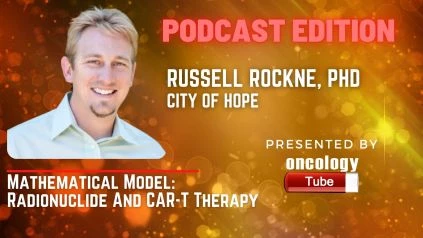Russell Rockne, Ph.D., associate professor, Department of Computational and Quantitative Medicine, City of Hope. In this video, he speaks about the AACR 2022 Abstract – 2732 / 3 – A mathematical model for optimization of combination therapy involving targeted radionuclide and CAR-T cell therapy.
Â
Observation –
Â
Origins:
Immunotherapy with chimeric antigen receptor – T (CAR-T) cells and targeted radionuclide therapy (TRT) are two promising cancer therapies. These medicines frequently have limited efficacy in completely eradicating cancer cells, making the combination of these two medications an appealing cancer treatment strategy. Because of the difficulties associated in administering and scheduling these medicines, mathematical modeling is an appropriate tool for assessing and predicting disease response to these medications. In this paper, we offer a mathematical model for assessing illness response to the combination of these two medicines, as well as investigate the optimization of their dose and schedule.
Â
Methodologies:Â
For the simulation of tumor response to CAR-T cell therapy and TRT, an ordinary differential equation-based formalism is developed. The model was fed CAR-T cell dosage and injected radioactivity. Key model parameters were, among others, tumor proliferation rate, tumor cell and CAR-T cell radiosensitivity, CAR-T cell killing rate, and CAR-T cell decay rate, which indicated persistence. The model was parameterized using preclinical research involving CS1-CAR-T cell treatment and 225Ac-DOTA-Daratumumab TRT in a multiple myeloma mouse model. To identify the parameters with the greatest influence, a sensitivity investigation of the model parameters was undertaken using overall survival (OS) and progression-free survival (PFS) as evaluation measures.
Â
Outcomes:
When CAR-T cell therapy was given prior to TRT, the OS and PFS were 97 and 55 days, respectively, compared to 43 days for untreated control mice. A sensitivity analysis of model parameters revealed that tumor proliferation had the greatest influence on survival measures. OS changed by -41 percent /+111 percent with a 50% change in tumor growth rate, and PFS changed by -62 percent /+147 percent. Similar improvements in TRT injected activity and CAR-T cell dosage increased OS by 15% and 21%, respectively. As a result, PFS changed by approximately 32% and 45%, respectively. A different period between the two medications revealed that faster-developing tumors required a shorter interval between the two therapies. Due to the negative effects of radiation on CAR-T cells, the sequence of therapies was also modified, and TRT prior to CAR-T cell therapy revealed a lower PFS (43 days).
Â
Implication:
The tumor proliferation rate was discovered to be the most important factor influencing therapy interval for a fixed dose of TRT and CAR-T cells. The study given here demonstrates the important factors required for preclinical experimentation and clinical trials planning and optimization. Using illness, CAR-T cell, and radionuclide-specific factors as demonstrated in this study, as well as including radiation’s immune-stimulating effects, it would be an exceptionally powerful tool for enhancing combination therapy.

